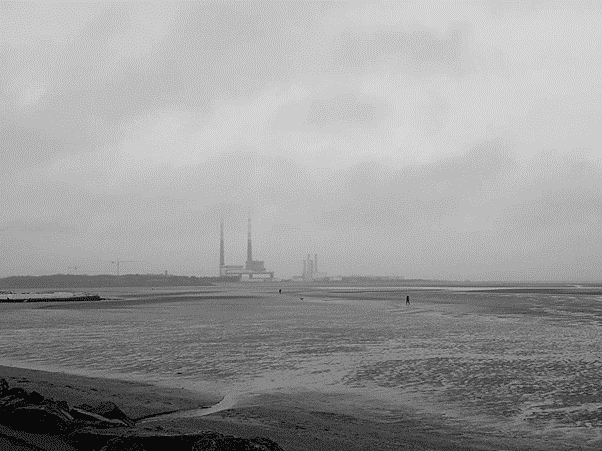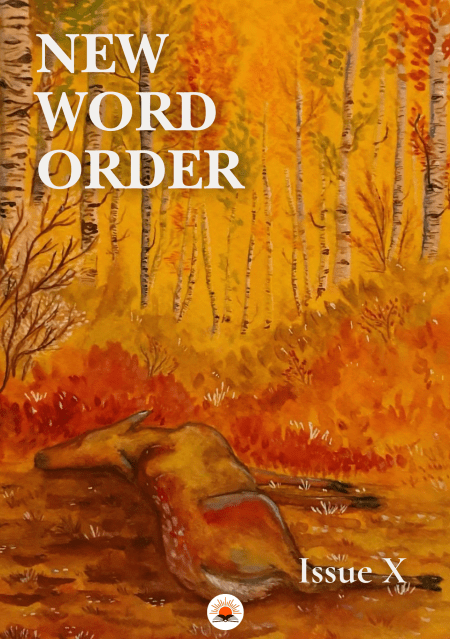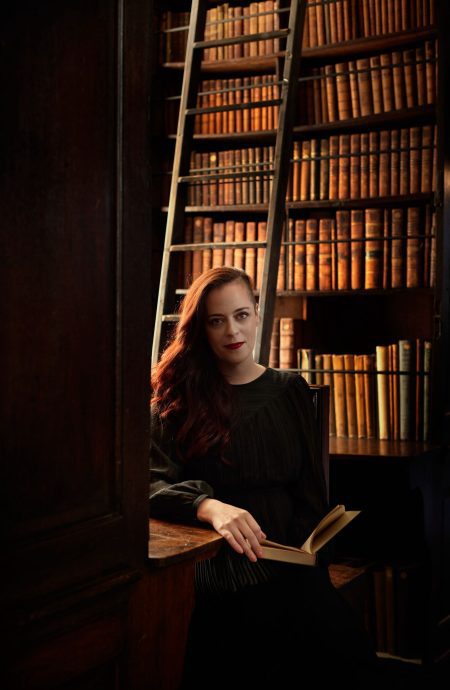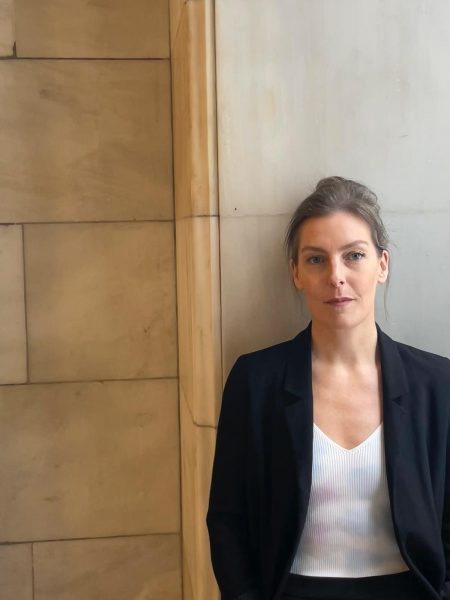By Cillian Barrett
Photography by Jeroen Mudde. His full profile is available in the Art & Photography section.
1
Here, under the green grass-woven waves, the soil breaks into limestone, rock peeking through the broken landscape, stiff-stuck remnants of an ancient age.
This is its own world, with its own set of rules.
The internal logic of soil is an untranslatable language, it is the soil on the hand, the dry, crisp soil; the wet, clumpy soil; the pure-slick muck-soil, it is the breath of air, translucence, rain pellets falling with the ping of a pebble on a pot – summer’s hangover red-spelled through freckles
The rules are not written but felt.
Nobody is safe. That is a rule.
We hear whispers in the night, when the palsy-limbed trees take counsel with each other.
We hear the footsteps muffled in the midnight dew.
Caolin says the men – when they come – will pack our little patch up, root the turf and turn it in upon itself. They’ll suck up all our dirt, that cake-like texture, the soft-certainty of soil – the substance of us.
Caolin knows the wiser of these Shadow Men – they live at the bottom of The River, feed on moss, sessile crustaceans, and lost coins.
On a late Tuesday we set out to find them.
2
The River is so slow it can be difficult to tell which way it’s flowing; at points, it hardly licks your knee – at others, deep enough to swallow you whole.
Caolin says that’s where the Shadow Men live, somewhere in the depths – we remind him that part of the river is off limits, and he shoves us for a response.
No arguing with that.
3
It’s evening, tracking through the tufts of grass, pale-green and stiff dry after a day of sticky warmth.
Over the body of the water, midges congregate, darting around like electrons, zipping in coordinated panic.
We stop at a small collection of rocks just big enough to peak through the surface.
The water laps around the rocks like the slow, soft licks of a calf’s tongue.
We stick our toes in the swirling white surf, and the tickling cold is addicting.
We sit down on the smoothest rock and let the water come up to our knees.
The world is turning autumn-amber, as the sun drops and reddens.
Caolin is throwing small rocks into the river, listening carefully for any response.
-Shout if you feel a vibration, Caolin says.
4
The Shadow Men wear rimmed glasses, their hair gleaming like tar, a natural side-effect of their aquatic tendencies. They wear three-piece suits, immaculately clean, though made of dull, grey fabric.
They carry leather-bound booklets, make fine notes with fine ink and fine handwriting, so neat the letters look typeset.
We ask Caolin where they learned to write but he doesn’t answer.
They come for the weak and flee the strong.
They got Mr. Hannegan.
In the middle of a quiet overcast day, with such solitude and stillness it was barely there, they came. They arrived at around two, and before three, Mr. Hannegan was gone.
Caolin says the victims go with the Shadow Men, somewhere underwater – watch the world tinted-aquamarine, find solace and calm with the darting fish, and nibble harmlessly on the barnacles of forgotten objects.
Such calmness in the life under water, you wouldn’t think them capable of cruelty.
He says, by the time the victim is entranced in the stillness of the underworld, they despise us air-breathers, they consider us impure and half-mad – they hate our quick way of living, how we grow and die in the blink of an age.
Underwater, time is so meaningless it’s insulting. They are jealous of our vigour and hatred, jealous of our endless hunger.
They never go hungry for The River is the substance of life.
5
Caolin’s experiments take him downriver, stopping periodically to throw another rock.
We shout after him and ask what the vibrations will feel like.
He says we’ll know when we feel it.
We shrug to ourselves and climb up out of the river.
Night is stealing in on a late autumn breeze – subtle chill – sky with lights melding like flames in a low-fired blaze – robin slinking songs to the lost day: a world retiring, disassembling itself, stone walls climbing down from their height, stacking their substance in dolmens to mark their existence, settling into the unseen ruts of rolling field, the hidden holes of cow-patch, the hard-worn secrets of existence.
We strip down and leap in.
The silence rushes to us, our body suddenly lifted, suspended.
Everything is still.
The murmurings of miniature bubbles trickle up past our ears.
We’ve been trying to open our eyes underwater for months.
Caolin can do it no problem.
Herself’s told stories of the Culkin lad that went blind. That was up in the city, by the factory; it was a runoff pool of chemicals but you could easily lose your eyes if some joker pissed in The River.
The current would carry it downstream.
We’ve seen Mr Dewley do it when he’s soused of a Sunday.
We tell ourselves on five we’ll open our eyes.
We don’t.
We surface.
The world is descending hue, past amber into bruise-blue. No last call of a robin, but instead the silence of aftermath, intermission: the point between day and night when figures join together and stillness moves.
We see a receding darkness that must be Caolin.
We shout after him but the darkness keeps moving.
We feel our nakedness now, the cold water pressing into us, the gentle current reminding us it’s alive – the Shadow Men, watching us from below.
We scramble to the grass bank and dress, shouting after Caolin.
We stumble back through the stumpy tufts of grass until the half-formed darkness produces his shape.
-Find any? we ask him.
-Cunning creatures, he mutters and that’s the last of it.
6
The Shadow Men continue to strike. They take the Clearys, the Clancys, the Devoys and the Heustons.
Caolin’s over them.
He starts working an apprenticeship at the Smithy. When Caolin comes home he eats, sleeps, and then disappears again. He has no time for discovering truths anymore.
He gets wiry and tough, his muscles small but steel. His face permanently dirty but not with the soil of a child – now he wears the dark, ash-smears of a working man, and intentionally lapses in washing to show off.
He doesn’t often push us around anymore; now he’s suddenly an adult, it’s beneath him. When he does shove in annoyance, it’s much firmer.
7
On a Thursday late enough to produce desperation, a blood-red sun reaching weakly through dark-fingered tree branches, we pull his leg in the potato patch.
We want to see him react – to see him acknowledge us – to prove he’s not as grown up as he pretends. We strike him with an open palm, and he kicks us until our left knee stops working.
-What’s your problem? he asks us, as he kicks. Why do you have to be a little shit?
-I hate you, we shout, as he pushes a handful of dirt into our mouth.
At this we cry.
The dirt tastes metallic, like dried-out cake without sugar or sweetness. It sticks in small clumps to the roof of our mouth, some of it trickling down the back of our throat.
Silence and stillness come naturally after so much violence. We sit and watch the blood-red sun dip. Caolin apologises for the dirt.
-But you started it, he says.
We accept the apology with a nod.
8
Herself fusses at the state of us by wringing a light-grey rag, bemoans the unruly children the Lord’s given Her. She warns us of God’s vengeance.
Himself stoops in through the front door, sits down at the table, and slaps His peak cap on His knee.
He glances around, taking in the dirt, the blood, our downcast eyes and Her slow shaking head, dish-towel twisting.
With a sigh, He stands.
He smacks Caolin on the back of the head and He smacks us on the arse, three times, hard.
He sits down and starts eating His supper.
-If you want to be fighting, He says, no need to fight each other – I’m always here.
9
On a lazy Tuesday, Caolin catches the flu and starts battling it. It’s strange to call it battling, when he is sprawled out on the bed, beads of raindrop sweat sitting on his forehead, face pale as winter sun.
10
On an early Wednesday, as the white-dewed grass wets our ankle-hair, we run into our first Shadow Man.
We’re walking the small road to the Dewley’s Farm, on a mission from Herself to collect eggs. The Dewleys keep fowls, and Mrs Dewley says she doesn’t know what to do with them, so she might as well give them away.
We know the wiser: Mr Dewley can cause awful havoc at the locals, when he’s deep into his drink, and Herself says Mrs Dewley tries to bribe good opinion with her eggs, though She says She’s grateful all the same and that Mrs Dewley has a good heart, after all.
We’re off to the side of the road-track, kicking the fluffy white dandelions, aiming to clip the head right at the stem, slicing it clean and sending the tiny, parachuted seeds to flitter and spin.
At a sudden bend in the track, It emerges, walking leisurely, hands in the pockets of neat, grey slacks, white shirtsleeves rolled to the elbow and a worn cotton-grey vest.
It wears small, gold-rimmed glasses, with a neatly pruned beard black as tar, and hair shining and tight.
The nose projects fiercely, hooking as a hen’s, two blue-green eyes indented and small, and a tiny mouth that looks constantly pursed.
We stop.
A Shadow Man in the flesh.
It glances at us but doesn’t stop.
We stare. We should look away, but something so terrifyingly mundane in Its appearance freezes us still.
-Nice enough day, I expect, It says.
11
On a Saturday with the first real chill of winter, as we near twelve, our world unravels suddenly. It is Himself who, eyebrows raised and frequently chuckling, interrogates us about the Shadow Men.
Slowly working his pipe, lying deep into His wooden chair, the way He does when He’s smoking.
The smoke curls sluggish in the air around the kitchen table, looking bluish-grey and solid in the lowly firelight.
It’s odd to hear laughter inside the house. An air of quiet suffering had descended upon us during Caolin’s sickness, as if it were impolite to have any joy, when Caolin couldn’t join in.
His fever has cleared up, suddenly. He was back at work today, and is now melting into his kitchen chair tiredly, eyelids half closed in the dim warmth of the fire.
-Gods will, Herself declared the recovery.
Caolin joins in the laughing, periodically but quietly, knowing it was he who started the nonsense in our head to begin with.
We are told tales about Estate Agents, the relationship between tenant and landlord, we learn that big word EVICTION. We lock the knowledge away in our head, understanding the principle but not the reality of it.
-The things you come up with, He says. You’re mad, you know, that’s the Doyle’s coming out now.
She shakes Her head.
-Leave off him, will you, She purrs. That’s definitely the Murphy-madness coming through, She adds, us Doyle’s aren’t creative enough.
We smile placatingly, looking between the two of them, knowing the wiser of having seen the flesh of a Shadow Man, as our father laughs for the last time in his life.
12
On a Sunday morning, Caolin is cold and firm as frozen salmon. We push him, shake him, but there is too much solidity to him. He is a slab of rock, and we feel he has changed permanently. We push him again and whisper his name, knowing now this must be death.
We lie still and quiet, hoping that by capturing his stillness we might trick him into waking up.
It doesn’t work.
We get out of bed and walk over to tell Themselves that our brother is dead.
13
They say Caolin lost the battle, but we see it as a draw since the flu went with him.
14
On a Friday that feels like Monday, we punch a tree with our bare fist until it starts to bleed. The knuckle-skin peels away in slices, the dull, throbbing pain in our bones driving us to punch harder, revealing a whitish underlayer of skin that progressively sharpens red.
The oval-shaped gashes are sticky with flesh-blood and sting when we clench our fist.
They never properly heal –we’ll always have oval-shaped indentations on our right fist’s knuckles.
We run our hand in The River and most of the blood washes away. We watch it recede slowly with the current, stringy and crimson, flittering like a chicken feather in wind. After a few paces it dilutes into nothing.
Themselves don’t notice the gash.
She becomes quieter after Caolin’s death.
15
On a day without a name, our Shadow Man comes to visit. With dark hair and gold glasses.
It pats our head in passing.
-Nice enough day out, It says.
We are made to stand outside, with a sky cod-white and nothing at all to latch onto, no warmth, no cold, no breeze. There is hushed discussion inside as we press our ear against the door.
16
After supper, we ask about it too many times, so He throws us out the front door into the dark and tells us to come back when we can pay for our own food.
Against the quiet backdrop of winter darkness – the wind-rustle of leaves sighing dramatically, and the blinking silver stars domed deceptively intimate – we listen to Them fight inside. Their voices get loud.
A fox begins a shrill howl in the distance.
17
We don’t ask Herself about the bruise because we already understand. He stops looking us in the eye and speaks in monosyllables.
He sleeps in our bed, and we sleep in with Herself.
In the night, He cries. He does it secretly, so quiet only the short, sharp gasps for air are audible.
We didn’t know He could cry.
18
On a Saturday with too much pollen, EVICTION is explained to us again, first by Herself, in waxing, waddling terms, and then by Himself, in serious, tragic terms.
He explains the plan to trek to the Mayo cousins.
We won’t see this soil again.
If that Shadow Man shows his face again, we’ll kill It. It was a cursed omen, we should have killed It the first time we saw It – if we had, Caolin would still be alive.
We know this is untrue, but hate is easier than pain.
19
At midnight on our last Tuesday, with a full, bone-white moon, we sneak out to The River.
The current rolls on infantile; the baby gurgle of water rippling round small stones.
We walk until the noise deepens beyond the reach of stones, levelling out into a smooth hush.
The quiet current is eery against the dead silence of a bone-white night.
The River’s surface shimmers with a sheen of silver, folding and rippling.
We strip, darkness and frozen moonlight running over our skin, goosebumps rearing in the midnight chill, hair standing – our teeth chatter.
Beneath the layer of silver-sheen, the water looks black as oil, impenetrable and deep.
We jump in feet first.
The flash-cold reaches across us and seizes our muscles – contracting instantly – our mouth opens to gasp and we close it again, as the air rolls up along our face in smooth oval bubbles. We shiver and curl inwards, clenching like a fist.
The silence in our ears – a silence so silent it has its own noise; the buzzing deadness of the underwater.
The world grows still, dark and silent as the prenatal womb, the rush of thoughts slowed with our heartbeat to one steady drum, as we think, in the fever of a second, this is what death feels like.
The thought calms us.
We strain to hold still, clenched and quiet, to listen for noise, our skin expectant, waiting for movement to reach out and brush us.
The slow, certain current, rolls round, noiselessly moving us – so slow it’s intangible.
Behind our closed eyes, we see morning, we see light coming back in a cautious crawl, we see vibrant images, floating outside of time.
The stone walls rebuild themselves, their moss-green beards as thick as yesterday – the auburn robin, fragile as fishbones, rears its tune – black leaf-shadow on brown tree-bark – limp-white sunlight shining through the shallow pallor of morning’s puddles, the soul spelt through light-pierced water – the birds of the sky like slinking eels – the distant hills of grass wind-shivered like stones cast into a river, ripple: the whisper of movement.
20
I open my eyes for the first time,
and the moonlight meets me.
I open my mouth
and the water rushes in – rushes up my nostrils.
I can see it, taste it – I can hear it at last
– the movement, the echo, the vibration –
feel it along my fish-white skin, as I open my arms, wide as they’ll reach,
and start to laugh.
Cillian Barrett
I am a 22-year-old Creative Writing student from Kildare, primarily interested in short, literary fiction. I have been published in Caveat Lector and was once called a “GENIUS” by the mad Ould-Fella who collects empty Guinness cans from under the bridge.



